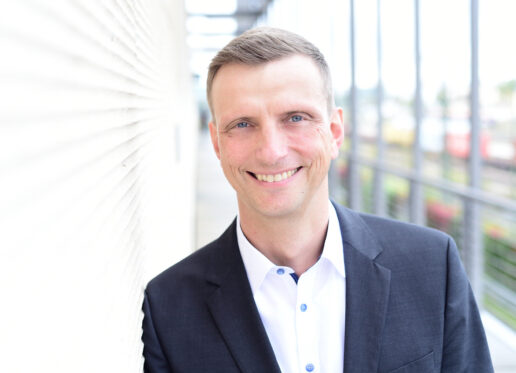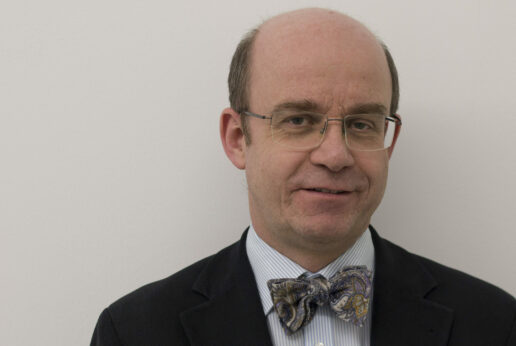Read next
IKS development project
Well positioned with a future-oriented topic
Fraunhofer IKS has established an advisory board to provide expert support to the IKS development project. The advisory board convened for its first regular meeting on April 14. The two Chairs, Thomas Gallner and Prof. Thomas Seidl, talk about their motivation for getting involved. And about the aspects on which they intend to focus.



© iStock.com/Orbon Alija
The Fraunhofer Institute for Cognitive Systems IKS will “establish expertise for the practical use of cognitive systems in a variety of application domains and test the findings with business partners to create the prerequisites for future industrial transfer in the Fraunhofer model.”
This is stated in the bylaws of the advisory board of the IKS development project. The Bavarian Ministry of Economic Affairs is supporting this thematic development of Fraunhofer IKS with a five-year funding initiative from 2019 to 2024 totaling 40.1 million euros — and with a clear mission: The institute is to develop the foundations for applying AI-based methods and technologies in resilient software-intensive systems.

Thomas Gallner is Head of Innovation Center and Technology Scouting at CARIAD, a Volkswagen Group company. He has lectured on Innovation Management at OTH Regensburg since 2019. Prior to this, Gallner worked at Continental for nearly 13 years, most recently as Head of Corporate Innovation Management. His career also includes stints at Siemens and Infineon, among others. He earned his master’s degree in Microsystems Engineering at OTH Regensburg in 1995.
Connected in many directions
On the way there, nine experts from business and academia, the IKS Project Advisory Board, will support Fraunhofer IKS. “I already know the predecessor institute, Fraunhofer ESK”, says Thomas Gallner, Chair of the Advisory Board. “I was a member of the Board of Trustees there.” Gallner, who is also Head of Innovation Center and Technology Scouting at CARIAD, a Volkswagen Group company, also wants to establish links with colleges and universities, research and science, as well as with startups. “The outside-in perspective is always important to us: What is happening in worldwide markets? In startups and in science?”, explains Gallner. As he sees it, the topic of artificial intelligence (AI) is absolutely crucial, not only for the Volkswagen Group but also for Germany as an industrial location overall.
His Deputy Chair is Prof. Thomas Seidl, Chair for Database Systems and Data Mining at the Institute for Computer Science of Ludwig-Maximilians-Universität (LMU) Munich. Collaboration with Fraunhofer-Gesellschaft is not new for him, either: “I am involved with Fraunhofer IIS at the ADA Lovelace Center,” says Seidl. “By serving on the IKS Advisory Board, I want to promote interrelationships within the Fraunhofer Institutes that are conducting research in related areas.” And of course he also hopes to strengthen the ties between Fraunhofer IKS and LMU.

Prof. Thomas Seidl is the Chair for Database Systems and Data Mining at Ludwig-Maximilians-Universität (LMU) Munich. He is spokesperson of the Munich Center for Machine Learning (MCML), the national AI competence center, and a member of the Board of Directors of the Leibniz Supercomputing Center (LRZ), and the elite Data Science study program, several scientific advisory boards and numerous program committees. After studying computer science at TU Munich, Seidel earned his PhD and postdoctoral qualification at LMU, to which he returned in 2016 after working at the University of Konstanz and RWTH Aachen University.
Seidl can also identify with the subjects of the research work at Fraunhofer IKS. “If we want to take AI and machine learning from research to the streets and general operation, then safety is of crucial importance.” Seidl believes that Fraunhofer IKS has an excellent position here. “They have well-founded experience with the safety of software systems. Applying it to cognitive systems that work with AI and machine learning is the institute’s major strength,” explains Seidl.
For Thomas Gallner, this focus on an important future-oriented topic is an incentive for serving as Chair of the Advisory Board. The locational advantage is another factor: “Munich is probably one of the best places in Germany to drive the topic of AI forward. It has the second-most important startup scene after Berlin and many DAX companies are also located in the state capital. A “Space Valley” is currently emerging in the surrounding area. Munich itself is a good crucible for technologies: We can build on a splendid tradition of research and at the same time have a good strategy for the future.”
The second part of our advisory board presentation focuses one of the core topics of research at Fraunhofer IKS: Safe Intelligence.
This work was funded by the Bavarian Ministry for Economic Affairs, Regional Development and Energy as part of a project to support the thematic development of the Institute for Cognitive Systems.



